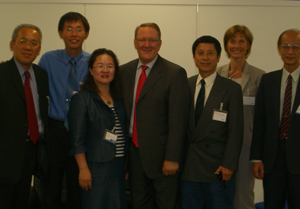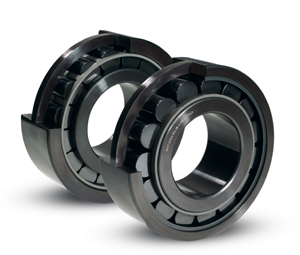SKF Shares Technical Insight With Industry Insiders at Press Day in Tokyo
2008/07/11 | By Ben ShenOn May 20 the Sweden-based SKF Group, a world-caliber manufacturer of bearings and related technologies, launched a technical press day in Tokyo, Japan aimed at further building its profile worldwide, and helping customers better access state-of-the-art technologies it has developed in recent years. The Tokyo technical press day also saw participation by the group subsidiaries in Taiwan and South Korea.

The SKF Group, founded on Feb. 16, 1907 by Swedish engineer Sven Wingguist, inventor of the self-aligning ball bearings, is the world's leading supplier of products, solutions and services revolving around rolling bearings, seals, mechantronics services and lubrication systems. SKF also offers technical support, maintenance services, condition monitoring and training.
Today, SKF is the world's largest manufacturer of not only bearings, but also seals, linear-motion products, maintenance products, condition-monitoring systems as well as industrial decision support systems.
Aware of its corporate responsibilities, SKF Bearing Services Taiwan sent a delegation to the Tokyo technical press day to not only broaden its own knowledge of the industry, but also help peers in Taiwan to do the same via delving into SKF Group's latest technological developments and technical services,.
The technical press day was hosted by SKF Group CEO and president Tom Johnstone, with the Taiwan contingent headed by Charles Chang, managing director of SKF Bearing Services Taiwan Ltd., and accompanied by representatives of the National Taiwan University, Taipei-based China Economic News Service and Taiwan Association of Machinery Industry.

"As in 1907, SKF's services today help customers get optimal value out of their investments. So over a hundred years, cutting-edge technology is directly, while being very sensitive to customers' service needs, worked into engineering solutions," Johnstone noted.
SKF Taiwan's Role
Chang noted that his company is dedicated to helping domestic manufacturing industry upgrade production skills to achieve sustainable operations, particularly in a period of industrial transformation in Taiwan. Over the past 19 years since its inception, SKF Taiwan has introduced a series of advanced manufacturing technologies and precision components as bearings and spindle systems to help domestic manufacturers of machine tools create more value-added products and services.
The Tokyo technical press day saw the SKF Group announce a list of achievements as a result of introducing a series of solutions for continuous casting mills, including improved productivity, process control and product quality; higher equipment reliability; reduced downtime; lower maintenance and related costs; and reduced environmental impact.
The SKFs' "ConRo Low" is a re-lubrication free roll unit for the horizontal stage of continuous casting machines. The ConRo Low is a greased and sealed unit requiring no re-lubrication that minimizes stoppage of continuous casting lines, which is mainly caused by rollers that become jammed from the scale and hardened grease built up during the simmering and humid conditions surrounding the caster.
The SKF Group noted that the "ConRo Low" is specially designed as a drop-in replacement, easily interchangeable with existing roll segments. This simplifies installation and virtually eliminates the chance of installation errors that could compromise product quality and service life.
Advanced Load and Steering Sensing Technology
The SKF has also developed advanced load and steering sensing systems that can be integrated into the next generation of vehicle control systems. This will contribute to making driving safer, easier and enable cars to more accurately respond to actual interactive forces between car wheels and roads.
With the load sensing systems integrated into SKF Hub Units (HBU), many carmakers today offer as standard equipment such wheel bearing component on their products. The HBUs being a drop-in replacement on current drivelines, this technology enhances driving safety and perhaps satisfaction by sensing loads close to the actual place of contact, or where tire and road interact. Feasibility studies have been successfully completed and further developments are expected to allow deliveries by 2010, allowing time for such technologies to be considered as part of the design process for the next generation of cars.
The SKF through-shaft sensors are designed to make steering easier and more precise. Based on existing, proven SKF technology focusing on positioning, angle and speed sensing, these sensors are 100% checked and integrated in a bearing positioned on a shaft from where they feed data via standard electronic controllers, which monitor the desired level of power the electric motors need to deliver to assist the driver to steer. The sensors enable more precise power-assist steering, from left-lock all through right-lock for all driving conditions, including highway to parking.
Breakthrough in Vibration Monitoring
The SKF has also introduced the "Multilog On-line System DMx," a multi-feature vibration monitor that is also intrinsically safe. The system conforms to the API-670 standard and is therefore ideal for critical machinery such as gas turbines, generator sets, motors, pumps and compressors in the hydrocarbon processing industry (HPI), power generation and other applications.
The Multilog DMx system combines both protection and condition monitoring functionality in a single device, providing continuous data acquisition to predict and prevent failures, protecting machinery by reacting to alarms that may signify potentially catastrophic breakdowns. Certain features of the system are believed to be unique and patents are pending.
The system's modular design, distributed architecture and compactness have advantages over traditional 19-inch rack systems. The DMx can be installed within hazardous areas, hence minimizing the need for infrastructures such as cables, cabinets and isolation barriers, saving time and money during installation. The low power consumption requirements of intrinsically safe devices are also more energy efficient compared to control room monitor racks.
According to Chris James, Business Area Director at SKF Reliability Systems, "Until now, field-installed intrinsically safe vibration devices have taken the form of simple transmitters that offer data on mechanical soundness. The complexity of measuring vibrations has been in conflict with the power restrictions imposed by intrinsic safety. With the DMx we've been able to resolve this conflict to offer a vibration monitoring solution that-for the first time-meets the requirements of critical mechanical monitoring: transducing dynamic data processing by an intrinsically safe device located on the machine skid."
Magnetic Bearings
The group said its magnetic bearing technology is part of the new variable speed drive solutions that are seeing screw compressors replaced by centrifugal turbo-machines in air and chiller compressor applications, achieving typical efficiency increase from 75% to 85%.
Such new technology is based on high-speed direct drives, coupling the compressor impeller to the drive-shaft, and using magnetic bearings as the support bearings. With magnetic bearings involving zero metal-to-metal contact, such bearings simply do not wear due to elimination of bearing friction. Also magnetic bearings are oil-free and hence very environmentally friendly, as well as able to operate safely at very high speeds for sophisticated control systems developed by SKF.
Earlier magnetic bearings were usually used in very unique or high-speed applications, but now have wider applications for SKF developments that have not only effectively reduced the size of the controllers, but have also achieved performance beyond levels originally considered possible.
Remote Condition Monitoring
In addition, SKF has also developed remote condition monitoring services for critical machinery on board ships that raise uptime, efficiency while reducing operating costs. SKF-certified engineers analyze operating data collected for selected marine machinery, and prescribe remedial actions as necessary. Such monitoring, data provision to enable remedial action response prolong troublefree mechnical operation, reducing maintenance costs. Also more importantly, it identifies serious equipment deterioration that, without attention, can cause severe mechanical breakdown to stop sailings, costing hundreds of thousands of dollars in repair cost and downtime, as well as delay cargo and passenger delivery.
The transmission of remotely sensed data is done efficiently and reduces staffing cost. All onboard personnel have to do is collect such data typically using portable devices or online/wireless systems, which SKF can supply. The data is then uploaded to a standard computer onboard a ship and relayed to a remote land-based server via a ship's normal communication system. SKF condition monitoring experts anywhere worldwide can access such data, from which SKF experts prepare maintenance reports in formats and content suited to needs of a particular ship and maintenance crew, with such report then emailed to a ship's chief engineer or operator for further action.
Having complex data analyzed by land-based experts has many benefits: a ship's engineer no longer has to worry about needing onboard skilled condition-monitoring technicians to do such critical work. Also with regular onboard staff turnovers throughout a year, the loss of knowledge, even only temporarily, is no longer a concern. The overall result is significantly improved maintenance of critical machinery, shipping efficiency and lower operating costs.




